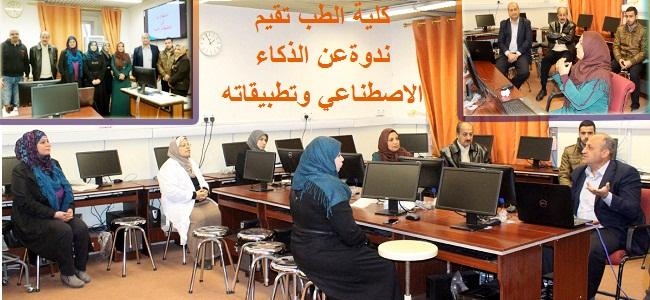
Al-Nahrain Media: Dr. Intisar Abbas
Under the sponsorship of the Dean of Al-Nahrain College of Medicine, Professor Dr. Alaa Ghani Hussein, a symposium was held about artificial intelligence and its applications. This symposium aims to explain the definition and history of the emergence and use of artificial intelligence.
With the presence of the college staff, the symposium included delivering lectures by Assistant Professor Dr. Hussein Salih Hassan, L. Dr. Sana Khudhair and L. Uruba Ismail respectively. The symposium dealt with computer programs that simulate human intellectual abilities and their patterns of work. The symposium also broached the most important characteristic which is the ability to learn, deduct and react to situations not programmed in the machine.
The first stage of artificial intelligence immediately began after the end of the Second World War. In 1950, Shannon published a paper on computer chess entitled "Programming a Computer for Playing Chess", and ended with the scientist Vernon Vinge 1963 who found solutions for games and puzzles decoding by using the computer.
The lecturers demonstrated that the subsequent stages of Artificial Neural Network which are mathematic techniques designed to simulate the way in which human brain conducts specific task.
This is done by a huge processing, distributed in parallel, consisting of small processing units, which are mathematical elements called neurons or Nodes).
These Neurons have nervous property, where they store the practical knowledge and empirical information to make them available to the user by adjusting the weights.
As for the use of artificial intelligence in medicine, it has been divided into three sections, namely:
1. Telemedicine: Formally defined, is the use of medical information exchanged from one site to another via electronic communications to improve a patient’s clinical health status. Telemedicine is the transfer of electronic medical data like (images, sounds, videos, high-definition patient records) from one site to another.
2. Smart systems used in the diagnosis of diseases (Experience Systems) are software designed to carry out tasks related to the human experience. Expert System is trying to carry out processes usually considered as human specialty including judging and decision making.
3. Robotic Surgery: Robot is defined as a machine designed to implement one or more tasks over and over again, with speed and accuracy. There are numerous types of robots with different tasks for each that must be implemented.
